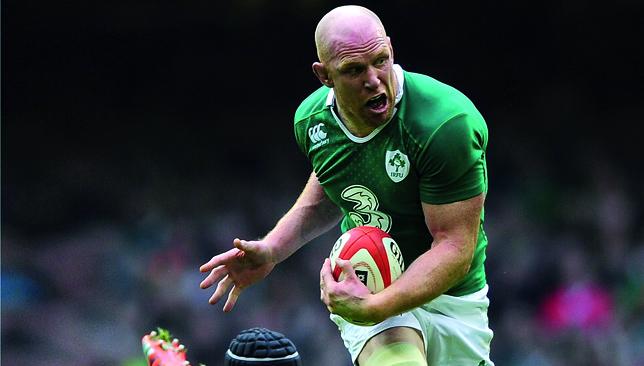
Talisman Paul O’Connell continues to be Ireland’s most-influential player and it will be a “mammoth task” for the Rugby World Cup-hopefuls to replace him, according to legendary former team-mate Ronan O’Gara.
O’Connell, 35, has decided to call time on Ireland duties with Joe Schmidt’s men after the tournament in England to focus on a switch to European Challenge Cup-holders Toulon.
The lock has been a colossal figure since his debut in the green jersey 13 years ago, racking up more than 100 appearances.
– RWC: Sport 360 E-Magazine Rugby World Cup guide
– #360debate: Will New Zealand retain the Rugby World Cup?
– #360podcast: Can anyone stop NZ from winning another RWC title?
Ireland’s all-time highest points scorer O’Gara, 38, knows the captain better than most, also lining up alongside him for provincial heavyweights Munster and the British and Irish Lions before calling time on his celebrated career two years ago.
Speaking to Sport360 prior to Saturday’s The Rugby Brunch alongside Scott Gibbs and David Wallace at JW Marriott Marquis Dubai, the celebrated fly-half emphasised the unmatchable contribution of O’Connell.
“Paul doesn’t do emotion or grandstanding,” said O’Gara, who is currently a member of Racing Metro’s coaching staff. “He is all about what happens on the pitch.
“He brings old school values to the squad and this is key. His influence and performances have been of immeasurable value to the Ireland team.
“There is plenty of talk about the importance of fly-half Johnny Sexton, but Paul is a talisman and a leader.

“He sets the standard for the rest of the team. He will leave a huge void when he retires from international rugby after the tournament and it is a mammoth task for Irish rugby to replace him, looking ahead.”
Ireland go into Saturday’s Pool D opener against Canada at Cardiff’s Millenium Stadium as two-time Six Nations holders. Central to this success has been O’Gara’s successor at No10, Sexton.
O’Gara helped guide the 30-year-old at Racing during the last two seasons and is well-positioned to judge the merits of the man hoping to kick his nation to a first-ever appearance at the RWC semi-finals or beyond.
“Sexton is undoubtedly one of the best in the Northern Hemisphere,” he said. “You also can look at England’s Owen Farrell as a very steady player.
“But another who really excites me is England’s first-choice George Ford. He oozes class, and for someone of his small stature he is such a danger with the ball.
“There is so much resting on his shoulders for England.”
O’Gara enjoyed a stellar career for province and country before his retirement two years ago. His 1,083 points in 128 appearances from 2000-13 for Ireland makes him the fourth-highest scorer in Test history, while 16 international tries is the most recorded by a fly-half playing for his nation.
Only the 2009 Six Nations was lifted by him on the global scene, but the 2005/06 and 2007/08 Heineken Cup victories were the highlights of a trophy-laden 16-year association with Munster.
But such joy wasn’t found during his three World Cup appearances alongside leading names such as O’Connell, superstar centre Brian O’Driscoll and scrum-half Peter Stringer.
Frustrating quarter-final defeats in 2003 and 2011 bookended an embarrassing pool-stage exit in 2007.
O’Gara appears, from the outside, to have had a golden career. Is Ireland’s lack of progress in the globe’s grandest competition the obvious exception?
“There have been a lot of disappointments in my career, make no mistake about that,” O’Gara dryly responded. “In 2003, we didn’t have the squad in a condition to win it.
“In 2007, we were hyped up but it ended in disappointment.
“When I look back on the 2011 squad, we were incredibly talented. The form was good and our provincial sides were dominating in Europe.
“But we learned a huge lesson about how ruthless cup rugby can be. We did exceptionally well in the group stage, beating all our opponents – including Australia.
“Then psychologically, we dropped a critical five per cent. We got caught out by Wales in the quarter-finals and we were on our way home – no second chances.”